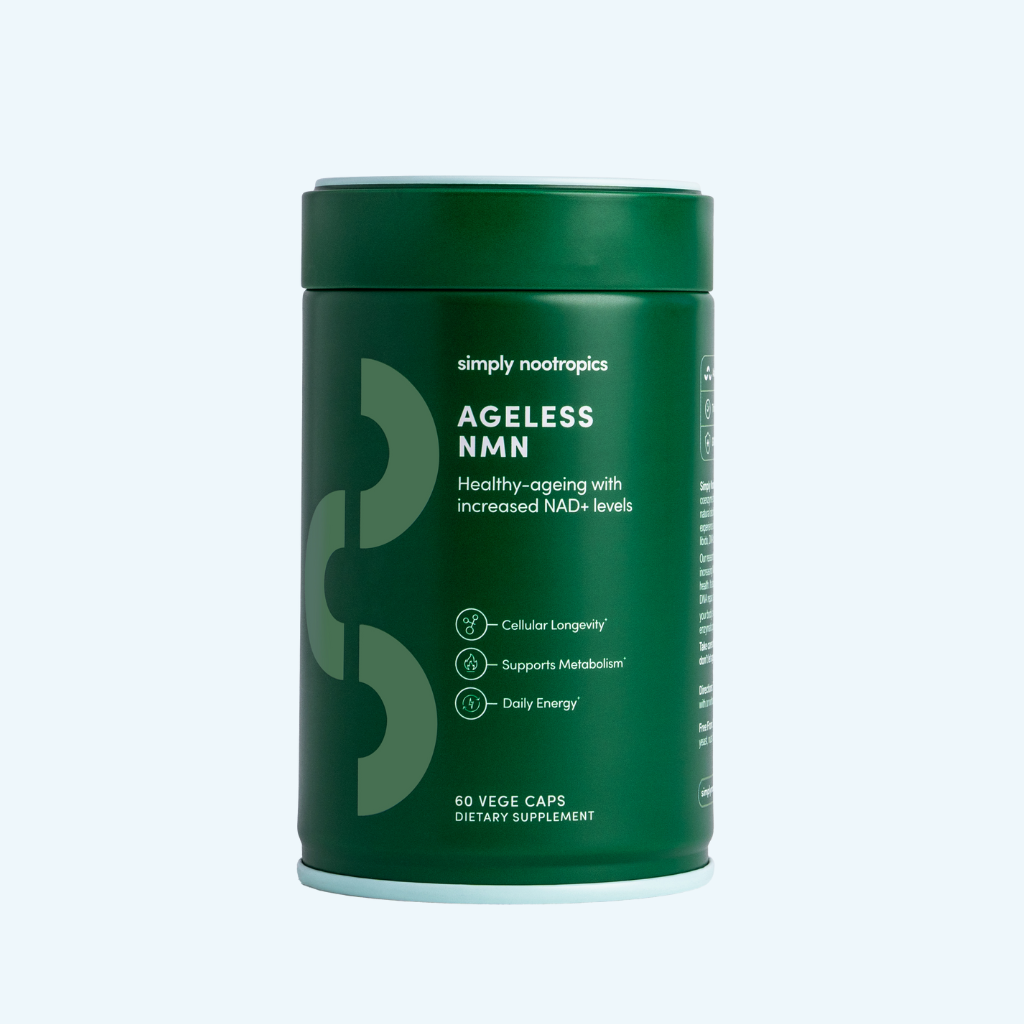Did you know that your diet can have a significant impact on the way you think and feel? Simply Nootropics Elevate helps deliver nutrition to your brain that can be difficult to near impossible to get through a normal diet. For example, you would need to drink the equivalent of 14 cups of green tea in one day to get the same level of L-Theanine in our product… Something we don't recommend!
There are however, some superfoods that can deliver cognitive boosting nutrients that will give you a further edge.
In this blog post I will introduce 10 superfoods that are proven to improve memory, focus and cognitive functions for performance.
Eating certain foods can affect your mood, the energy of your brain, and how you handle stress. Your brain consumes 20% of the calories you consume, and can be replenished by eating healthy foods. Let's get into it.
Blueberries.
Berries are antioxidant powerhouses protecting the brain from oxidative damage and stress that leads to premature ageing, Alzheimer's, and dementia.
Blueberries are believed to have one of the highest antioxidant levels of all common fruits and vegetables. The main antioxidant compounds in blueberries belong to a family of polyphenols antioxidants called flavonoids.
Blueberries and flavonoids are known to increase the communication between neurons leading to improved memory, learning and cognitive functions including reasoning, decision-making, verbal comprehension and numerical ability.
Legumes.
Legumes are an excellent source of complex carbohydrates. These complex carbohydrates are also mixed with fibre that slow down absorption, providing a steady supply of glucose to the brain without the risks of sugar spikes associated with many other sugar sources.
Legumes are also rich in folate and B vitamins, critical to brain performance.
Mint.
In addition to being refreshing and delicious, mint is a good source of vitamins A and C. Vitamin A helps improve learning capacity while vitamin C may protect the brain against degenerative effects of ageing.
Mint affects brain functioning by boosting alertness and memory. It also helps improve basic clerical skills such as typing and memorization.
Broccoli.
One of the many benefits to eating broccoli is ultimately a boost in brain power as it contains vitamins and other nutrients that are proven prevention against free radicals. It's rich in calcium, vitamin C, B vitamins Beta carotene, iron, fibre, and vitamin K.
Broccoli is also great for maintaining proper blood circulation and remove heavy metals that can damage the brain. Broccoli potassium content helps the nervous system, which in turn helps the brain. Research also suggests that broccoli can help contribute to the brain healing itself in the event of an injury.
That's quite powerful for a vegetable. It's not just limited to broccoli but also the cruciferous family - including cauliflower and brussel sprouts.
Beetroot.
Beetroot is high in nitrates, which help increase blood flow and parts of the brain related to executive functioning. Beefs also contain lots of vitamin B nine, which can add cognitive functioning in delay dementia.
In addition, beats or rich in carotenoids, which can help boost brain functioning and save off depression.
Seeds.
Sunflower seeds and pumpkin seeds especially are great for the brain. They contain a rich mix of protein, Omega fatty acids, and B vitamins.
These seeds contain tryptophan, which the brain converts into serotonin to boost mood and combat depression. Serotonin is a chemical in the brain that can affect mood. Eating seeds can directly improve your mood and how you feel, how good!
Quinoa.
Quinoa is a healthy whole grain that provides complex carbohydrates and fibre to balance blood sugar while supplying the brain with the glucose it needs to function. Quinoa also contains iron, which helps keep your blood oxygenated.
While B vitamins balance mood and protect blood vessels. It's also gluten-free for those with sensitivities to this protein. Quinoa should be soaked overnight before cooking.
Nuts.
Walnuts and almonds are some of the best brain boosting foods on the planet, and they're also very good for the nervous system. Nuts contain Omega three fatty acids which have been shown to improve brain power, reduce inflammation (and thereby protect against dementia), stimulate cognitive functions, lower the chance of heart disease.
MCT oil.
MCT oil’s (medium-chain fatty acid triglycerides) are designed to keep you energized throughout the day, while boosting health, suppressing appetite, and burning fat.
Coconut-derived medium chain triglycerides (MCTs) are easily converted in the liver into ketones--powerful substances that improve cognitive performance. Ketones allow the body to produce energy from good fats rather than from sugar and carbohydrates.
You can add MCT oil in your smoothie, coffee or add it on your salad.
Avocado.
Number eight, Avocado Good quality fats are extremely important for brain house, and avocados are a really good source of monounsaturated fats, Omega three and Omega six fatty acids. These increased blood flow to the brain lower cholesterol and aid in the absorption of antioxidants.
Avocados also come with many antioxidants of their own, including vitamin E, which protect the body and the brain from free radical damage.
They're also a good source of potassium and vitamin K both protect the brain from the risk of stroke.
Summary:
Some of these foods contain the compounds necessary to improve the structural integrity of different parts (neurons) in the brain. These compounds can help to ensure better cognitive functioning. Other types, such as sugars and saturated fats, may damage the structural integrity of these cells.
These 10 brain-boosting foods could help improve memory, concentration and cognitive functions. Some may also reduce the risk of stroke and age-related neurodegenerative diseases, such as Alzheimer’s and Parkinson’s.















